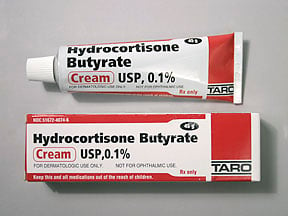
Hydrocortisone Butyrate Coupons & Savings Card – Discount Prices from $21.02
Generic for: Locoid
Hydrocortisone butyrate is a medium-strength steroid medication designed to treat various skin conditions, including eczema, dermatitis, allergies, and rashes. It helps alleviate inflammation, itching, and redness associated with these conditions. Additionally, it is effective in managing severe dandruff, known as seborrheic dermatitis. This medication is available in several forms, such as creams, ointments, lotions, and solutions. Some lower strengths can be bought over the counter, while higher strengths require a prescription. Generally, users experience minimal side effects when using hydrocortisone as prescribed, though rare cases of topical steroid withdrawal (TSW) may occur. It is important to consult with healthcare professionals for personalized advice and to discuss any worsening skin symptoms after discontinuation.
Our coupons are free to use. Before paying, show the pharmacist your Hydrocortisone Butyrate savings card to get your free discount. Use our filters below to edit the prescription box to match your needs. The Hydrocortisone Butyrate prices will update based on your prescription needs. Above our Hydrocortisone Butyrate coupons, you can change your location to see pharmacy prices and costs in other areas. We're here to help you buy Hydrocortisone Butyrate at the lowest price with our prescription discount card.
My prescription
Edit
15GM of 0.1%, Hydrocortisone Butyrate (1 Tube)
Select pharmacy

CVS
$36.23
COUPON PRICE
Walgreens
$21.02
COUPON PRICE
Walmart
$34.70
COUPON PRICE
Albertsons
$42.66
COUPON PRICEHydrocortisone Butyrate savings card
Show this card to your pharmacist
Walgreens
$21.02
BIN
ID
PCN
GRP
015995
LHKPW930857
GDC
DR33
Powered by
Hydrocortisone butyrate is a medium-strength steroid medication designed to treat various skin conditions, including eczema, dermatitis, allergies, and rashes. It helps alleviate inflammation, itching, and redness associated with these conditions. Additionally, it is effective in managing severe dandruff, known as seborrheic dermatitis. This medication is available in several forms, such as creams, ointments, lotions, and solutions. Some lower strengths can be bought over the counter, while higher strengths require a prescription. Generally, users experience minimal side effects when using hydrocortisone as prescribed, though rare cases of topical steroid withdrawal (TSW) may occur. It is important to consult with healthcare professionals for personalized advice and to discuss any worsening skin symptoms after discontinuation.
Our coupons are free to use. Before paying, show the pharmacist your Hydrocortisone Butyrate savings card to get your free discount. Use our filters below to edit the prescription box to match your needs. The Hydrocortisone Butyrate prices will update based on your prescription needs. Above our Hydrocortisone Butyrate coupons, you can change your location to see pharmacy prices and costs in other areas. We're here to help you buy Hydrocortisone Butyrate at the lowest price with our prescription discount card.
More prescriptions for skin allergy
coupons from$27.16Save 70%
coupons from$4.25Save 84%
coupons from$1.01Save 95%
coupons from$617.96Save 73%
coupons from$1499.11Save 72%
coupons from$19.83Save 80%
coupons from$102.59Save 76%
coupons from$29.04Save 62%
More prescriptions for skin allergy
Fluocinolone Save 70%coupons from $27.16
Diprolene Af Save 84%coupons from $4.25
Phenergan Save 95%coupons from $1.01
Apexicon E Save 73%coupons from $617.96
Atopaderm Save 72%coupons from $1499.11
Dexamethasone Intensol Save 80%coupons from $19.83
Dexchlorpheniramine Save 76%coupons from $102.59
Clodan Save 62%coupons from $29.04
Hydrocortisone Butyrate dosage forms
Use our Hydrocortisone Butyrate 15GM of 0.1% coupon with prices from $34.70 for 1 Tube. You can also use our Hydrocortisone Butyrate 15GM of 0.1% coupon with prices from $54.17 for 2 Tubes. We have a Hydrocortisone Butyrate 15GM of 0.1% coupon with prices from $72.10 for 3 Tubes.
Dosage Quantity Price from Per unit 15GM of 0.1% 1 Tube $34.70 $34.70 15GM of 0.1% 2 Tubes $54.17 $27.09 15GM of 0.1% 3 Tubes $72.10 $24.03
| Dosage | Quantity | Price from | Per unit |
|---|---|---|---|
| 15GM of 0.1% | 1 Tube | $34.70 | $34.70 |
| 15GM of 0.1% | 2 Tubes | $54.17 | $27.09 |
| 15GM of 0.1% | 3 Tubes | $72.10 | $24.03 |
